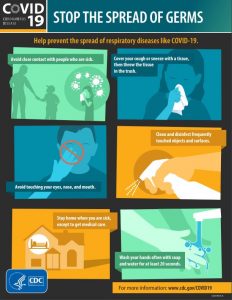
Talking to Children about the Coronavirus
The National Association of School Nurses and the National Association of School Psychologists offer the following suggestions when talking to children about the coronavirus.
A new type of coronavirus, abbreviated COVID-19, is causing an outbreak of respiratory (lung) disease. It was first detected in China and has now been detected internationally. While the immediate health risk in the United States is low, it is important to plan for any possible outbreaks if the risk level increases in the future.
Concern over this new virus can make children and families anxious. While we don’t know where and to what extent the disease may spread here in the United States, we do know that it is contagious, that the severity of the illness can vary from individual to individual, and that there are steps we can take to prevent the spread of infection. Acknowledging some level of concern, without panicking, is appropriate and can result in taking actions that reduce the risk of illness. Helping children cope with anxiety requires providing accurate prevention information and facts without causing undue alarm.
It is very important to remember that children look to adults for guidance on how to react to stressful events. If parents seem overly worried, children’s anxiety may rise. Parents should reassure children that health and school officials are working hard to ensure that people throughout the country stay healthy. However, children also need factual, age-appropriate information about the potential seriousness of disease risk and concrete instruction about how to avoid infections and the spread of
disease. Teaching children positive preventive measures, talking with them about their fears, and giving them a sense of some control over their risk of infection can help reduce anxiety.
Specific Guidelines
Remain calm and reassuring.
• Children will react to and follow your verbal and nonverbal reactions.
• What you say and do about COVID-19, current prevention efforts, and related events can either
increase or decrease your children’s anxiety.
• If true, emphasize to your children that they and your family are fine.
• Remind them that you and the adults at their school are there to keep them safe and healthy.
• Let your children talk about their feelings and help reframe their concerns into the appropriate perspective.
Make yourself available.
• Children may need extra attention from you and may want to talk about their concerns, fears, and questions.
• It is important that they know they have someone who will listen to them; make time for them.
• Tell them you love them and give them plenty of affection.
Avoid excessive blaming.
• When tensions are high, sometimes we try to blame someone.
• It is important to avoid stereotyping any one group of people as responsible for the virus.
• Bullying or negative comments made toward others should be stopped and reported to the school.
• Be aware of any comments that other adults are having around your family. You may have to explain what comments mean if they are different than the values that you have at home.
Monitor television viewing and social media.
• Limit television viewing or access to information on the Internet and through social media. Try to avoid watching or listening to information that might be upsetting when your children are present.
• Speak to your child about how many stories about COVID-19 on the Internet may be based on rumors and inaccurate information.
• Talk to your child about factual information about this disease—this can help reduce anxiety.
• Constantly watching updates on the status of COVID-19 can increase anxiety—avoid this.
• Be aware that developmentally inappropriate information (i.e., information designed for adults) can cause anxiety or confusion, particularly in young children.
• Engage your child in games or other interesting activities instead.
Maintain a normal routine to the extent possible.
• Keep to a regular schedule, as this can be reassuring and promotes physical health.
• Encourage your children to keep up with their schoolwork and extracurricular activities, but don’t push them if they seem overwhelmed.
Be honest and accurate.
• In the absence of factual information, children often imagine situations far worse than reality.
• Don’t ignore their concerns, but rather explain that at the present moment very few people in this country are sick with COVID-19.
• Children can be told this disease is thought to be spread between people who are in close contact with one another—when an infected person coughs or sneezes.
• It is also thought it can be spread when you touch an infected surface or object, which is why it is so important to protect yourself.
Additional Information:

